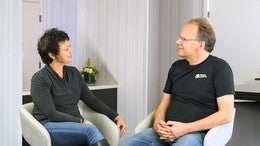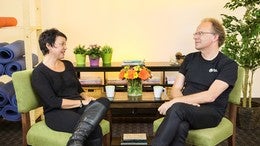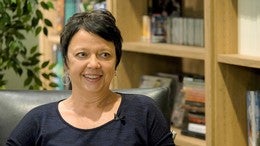Description
About This Video
Transcript
Read Full Transcript
Chapter 1
Expectations and Happiness
I'm very excited to be here with my longterm friend, Kara Risa. This is the third time that we've had a conversation together that's been filmed for plot is anytime since we last filmed a business conversation. We've had dinner a few times and during that time our conversation has turned quite often to more philosophical issues around the pursuit of happiness and the purpose of life. So with this ticket at a time, we're going to explore some of the subjects that we've covered during those conversations. Are you guys resolution for 2017 was to pursue more happiness in my life and in the process of researching the subject of happiness, I came across a particular article and this research was done by a hospice nurse in Australia by the name of Bronnie ware and what she noticed as she nursed thousands of people through the last phase of their lives, that they typically had five regrets that didn't necessarily have them all, but these were the five regrets that she saw more and more. And it kind of might sound kind of sad to be doing this video, talking about the regrets as we reached the last pages of our lives.
But I think by looking at these, we're able to draw some conclusions about how to live a full and happy life and how to pursue a real fulfilling profession within the polarities industry. Absolutely. So the first of the regrets that she regularly saw, this was what she concluded. I wish I'd had the courage to live a life true to myself and not alive that others expected of me. And many of us have come from families or societies where we're expected of many things, but then not necessarily what we want to do.
If you see that ever, Kara.
Am I still doing this for the real authentic reasons that I was originally attracted to it? And how do I keep adjusting that? You know, I think there's this, this kind of way that things have to keep moving. Things have to keep changing. Yeah. Um, which, which helps us along in that path of being more satisfied or, um, gratified in, in our participation in our lives and, and therefore our careers.
But um, I think it's one of those things you have to be honest to yourself and do what your heart tells you to do. Even if other people around you and people that you really value and you respect maybe pushing you in a different way. For some people in the police profession, they feel that the next step in everybody's career should be go from being a great [inaudible] teacher to being a studio owner. Um, but my own thoughts on this is, you know, running a business and being a studio on it isn't for everybody
Chapter 2
Work-Life Balance
The kind of interesting thing about hard work is I've always enjoyed how it works, but this sort of hard work and there's hard, right? And when I'm really in the flow and I'm just loving what I can do, I can be working at it for hours and not even notice the time going by. But some things, you know, the things I really don't relish it can dry.
Like is it your, like I'm thinking about teaching pilots all day or working on, um, on quality's anytime all day. Like what, what actually keeps you in that flow? What is, what is that?
So how do you keep work? Interesting.
What is, what is keeping them in pain or what is Ma making them distracted? What could I be doing to bring their nervous system in check or whatever your, your Gig is. But, but that kind of curiosity of being just a little better, a little better at your job, a little more professional. You know, you read a few articles on the weekend about body mind or about injury prevention or whatever, and suddenly you're, you're fresh. You have a new feeling in the day of like, and your day flies by because you're practicing a new learning skill. A new way of seeing. And I think this is, and this is a hard thing to train yourself in, but, but I think it's, um, it's something about keeping yourself turned on, isn't it?
I think there's this issue around continuous learning that you know you don't go to college, you've learned everything and it's going to last your lifetime. I think the learning you have, you know whether or not it's [inaudible] or whether it's other professions that you've learned something new and then to be able to apply it in what you're doing every day and just deal with somethings a little bit harder or do it a little bit better than you did at the prior week. Absolutely. That is what kind of makes the work kind of interesting because if you don't, you know, you become more skilled, but if you don't take on a harder challenge, why don't you push yourself to be that little bit better, then you become uninterested. I think the other way of kind of thinking about, I wish I hadn't worked so hard is trying to find that balance between all the parts of your life for sure. And the to some of the things I would regret is my children are grown up, but I regret having not been at some of the milestones in their lives because I felt I was too busy at work. And right now I can only remember that I missed that particular childhood event.
Right. I have no recollection of what that very important piece of work force that I had to be there and I couldn't be with my children. So I think that, you know, this to me there's two aspects of this. There's the aspect of challenging yourself so that the work doesn't feel like it's hard, boring work. And then the other thing is trying to find the balance between all the parts of our lives so that we don't get consumed and being at work all day. So those are the two things that I think that she was that, that sort of Gretz that she's talking.
And then there's the empty nesting phase after that. And during all of those times where that work balance is between hours on the job hours, prepping a parent and hours, um, being with your friends changes. So this is something that I think we all need to kind of think about it. Depending on where we are on the life and comparing ourselves to our fellow workers may not be the right way of deciding how hard we need to work.
Chapter 3
Expressing Feelings
And I'm not a Cloudy's teacher, so I don't do corrections. I don't touch people's bodies very much. And I was brought up in that culture where you have this square around you and you know, you don't dare go in there. And when you meet your close friends, you shake them by the hand, you a hug would be seen as very inappropriate. And, uh, you know, some of the research on this happiness area is that we get a lot of joy. A lot of hormones are released in our body when we hug other people.
So this has been, this has been the last five years has been my journey of uh, touch and hugging and, uh, being a lot more demonstrative. And one of the things in my, in the, in the, the team here is that, you know, if somebody does something awesome, I really feel like the time to tell them that it was awesome is not at the end of the year when we do a performance review. But as in that moment of just saying, you know, you're awesome. I couldn't agree more. So that that's been, um, some of my journey about expressing my feelings is, you know, that emotion that I feel at the time telling people they're great. And on the flip side, I think there's a lot of release in that if somebody is doing something that's irritating to tell them straight away. Yeah, I agree.
You don't bottle it up and then suddenly like it kind of vomit out all this angst and anger and frustration, but it's much, much, much, much better. As you know, I saw that you had a client, had you mind picking up the mat or the ball or whatever and put it in the bag. Just tell them within a minute of them doing it because, or when they, when that person's finished with that client, but don't, you know, like, hold it in for hours, just, you know, just do it then. It's much softer. It's much easier on everybody.
I think, um, it's, uh, it's difficult to, um, give negative feedback or to put, have boundaries to say like, Hey, that's not okay with me. Or, and so I think part of what you do when you're creating a work environment, I think you and I both done this as managers, is to establish a sort of, um, environment that invite people to be able to sort of just do that without being offensive. You know, we have like a little bell. We ring, it's called our a Rin at the studio. It's a little Buddhist bell. Um, when somebody's being too loud, you just
And particularly with your clients, you know, we have the sense of teaching people's bodies that we're, we're correcting them, you know, that our job is to like fix them. Well, I think it could be the other way. I think job is to encourage that. The job is to say, Hey, guess what? You're amazing and that didn't hurt. And their nervous system is going to change, right? Yeah. They're gonna. They're gonna just, and, and what you said about touch, I mean, there's a wonderful book out there by a, a neuroscientist, I think it's a neuroscientist, um, called touch. And it's all about the way the, the, the neurology of the body and the biochemistry of the body actually gives you the good drugs from your brain when you're touched. So, so these are our tools we can use to be more successful at, um, both how we manage and how we work with humans one-on-one.
That's exactly right. And so I think being generous on the praise, I think that is part of this. So I also feel they, you know, my body feels better when I've kind of gone up to somebody and said that was just so good. There's joy in that. Giving a phrase as much as there is in receiving praise, there's no question about it. I would have to say there's a little bit of consent in this, that in my hugging experience of the last five years, there's some people that are never gonna enjoy a good hug from me. And I have to kind of accept that. That's
Um, but there is a way, there is a hug in the way you can talk and the way you can coach somebody in the way you can listen to somebody.
Chapter 4
Staying in Touch
And so I think as we're guiding people along the way and you have a lot of people working for you, you're, you're probably doing the same as I'm doing, which is you're encouraging them to work hard, get the job done, do an excellent job at that, exceed that if they can, but also really enjoy their lives. Really make sure they're fulfilled in the other ways because if they're not, what they end up bringing to at work is, is, is less than. Um, so, so part of managing people is actually encouraging them I think too, to keep their life balanced. And for all the independent contractors out there teaching parties, you know, you guys are your own managers. So it's about, you know, finding that yourself and knowing, Hey, I've got to take a day off. You know, but just make sure you tell your boss with enough notice,
So if you can fit it, if you can do your 30 hours and fit in your visit time with your friends and your family, I think you know, you, you can stop feeling guilty about it and actually enjoy being there.
Like if you make your 20 hours this week, I mean, it's catching go right. It's a touch and go situation teaching. So, um, so some of it is about finding the balance, but some of it is about, you know, when you work for yourself, you're probably the hardest on yourself and you have to back off a little bit and know it's, you gotta get the long picture. It's not the week, it's the year. It's not the year. It's the 10 years. Um, and, and back off a little bit from time to time. That'd be good advice for me to give myself John. Okay. Keep that in mind.
Chapter 5
Being Happy
Next time we have lunch,
What she interestingly talks about this, he says it's a very common regret that people have and that many people did not realize until the end that happiness is a choice. Oh, you can choose the way that you see life and you can choose happiness. It's the choices that a lot of people get stuck in existing habits and keep on living life the same way. But you can make some kind of very small changes and become a lot happier with things.
And so I love that concept and I think when it comes to, to teaching PyLadies and being on the floor and being in this field or you know, any field really, but, but to, to the people I were talking to, there's, there's a way in which sometimes they, you know, you have these clients think they stay with you forever. You know, I have clients I've been seeing for 17 years. Um, and sometimes it gets stale, you know, sometimes you're like, okay, I don't want to see this person anymore. I was, I haven't had any conversation with somebody last night who said they broke up with one of their classes recently and I was like, good for you. Yeah. Good for you. Like you, you can move things around. You don't have to get stuck. And once you're feeling stuck, you're going to go to that, that, that said set of feelings that are or are not as as joyful. And so it's up to you to change that. You're actually not stuck. You just forgot that you need to change something.
And I think really we need to be doing that all the time. You know, like, this schedule is not working for me anymore. This client load is not working for me anymore. I want to be doing something, I want to go to the next place. Um, and then it's really about, you know, motivating confidence, finding mentors, finding ways about it, but that, um, that stuckness means you need to get moving.
You maybe the people you've worked with the change and it's no longer the right place for you. But there's that inertia. It's very easy to kind of just keep on doing the same thing.
Maybe pick up a new skill set that they could add to it or collaborate with people that, um, and, and I think mostly the thing that holds people back is, is the fear of that. It's the fear of like, wow, I, you know, I've always worked for this organization doing this thing and I see all these people doing this thing on their own. How do I get there? You know? And I think the first step of getting there is just being willing to take the, as Pema children would say take the plunge, you know, you take the risk and then you find really good people who you admire who are doing that and you say, hey, how, how do you do that?
So sometimes you have to double up or double down however that phrase is used and, and um, and, and let it be revealed. And um, I don't know. I feel really like, I really like that message for people. I feel like you and I have had sort of the luck of the draw of just kind of doing that and, and finding our way. And I'm not even sure it's as easy for people as it was for in the moment where both you and I became entrepreneurs, but I, so I, I feel really, particularly in this conversation where we're talking to people about this concept of enjoying life and fulfillment is like, take the risk and, and be smart about it, but don't be afraid to get smarter, more, more awesome. Um, and ask for friends to help you along the way. Right? Yeah. It's hard to do alone. It's better.
It's better with friends. Everything's better with friends. Exactly.
Comments
You need to be a subscriber to post a comment.
Please Log In or Create an Account to start your free trial.





















